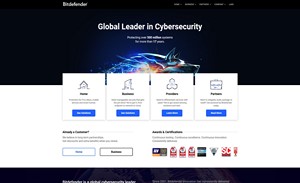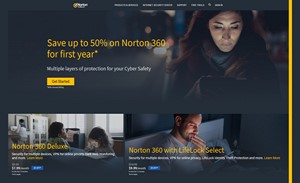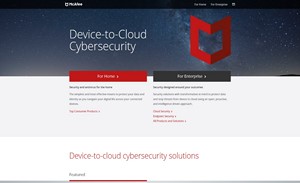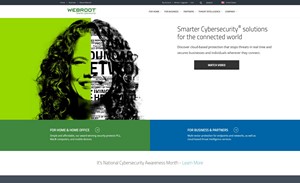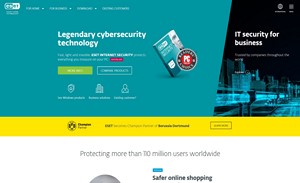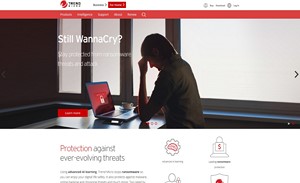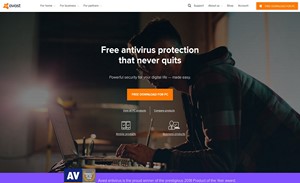Best Antivirus Software 2023
Best Antivirus for PC
FAQ / What is an antivirus product?
An antivirus software for PC is a program that is designed to detect, prevent, and remove malware (malicious software) from your computer. These types of software typically use a combination of techniques, such as signature-based detection, heuristic detection, and behavioral analysis, to identify and block threats. Common types of malware that antivirus software can protect against include viruses, worms, Trojan horses, ransomware, adware, and spyware.
An antivirus software works by constantly monitoring your computer for suspicious activity and blocking or removing any malware that it detects. It also typically includes a feature that allows you to schedule regular scans of your computer to check for any potential threats. Some antivirus software also includes additional tools to protect your computer such as firewalls, intrusion detection, and browsing protection.
It's important to note that antivirus software should be kept up to date to ensure the best protection against the latest malware threats.
FAQ / Do you need antivirus on my PC?
It is generally recommended to have an antivirus software installed on your PC to protect it from malware and other types of cyber threats. While it is possible to use a computer without antivirus protection, it is more vulnerable to attacks and can become infected with malware that can cause serious damage to your system or steal your personal information.
Antivirus software can protect your computer by constantly monitoring it for suspicious activity and blocking or removing any malware that it detects. It also typically includes a feature that allows you to schedule regular scans of your computer to check for any potential threats. Some antivirus software also includes additional tools to protect your computer such as firewalls, intrusion detection, and browsing protection.
It's worth to note that, Antivirus software is not a panacea, and it's not guaranteed that your PC won't be infected, but it greatly reduces the risk of being infected and helps you to detect and remove malware if it does get through.
In conclusion, while it is possible to use a computer without antivirus protection, it is not recommended, as it puts your computer at risk of being infected with malware and other types of cyber threats.
FAQ / Do you need antivirus if I have Windows 10 and Windows 11?
While Windows 10 and Windows 11 have built-in security features, such as Windows Defender, it's still a good idea to have additional antivirus software installed. Windows Defender is a good start, but it may not be able to detect all types of malware, and it's always a good idea to have multiple layers of security to protect your computer. Additionally, an antivirus software can provide additional features, such as real-time scanning and protection, which can help to prevent malware from being installed in the first place. So, I would recommend having a good antivirus software installed along with Windows Defender.
FAQ / Does an antivirus remove viruses?
An antivirus program can detect and remove viruses, as well as other types of malware such as worms, Trojans, and spyware. The antivirus software scans your computer's files and compares them to a database of known malware. If it finds a match, it will attempt to remove the malware or quarantine it, so it can't cause any further harm to your computer. Some antivirus programs also have real-time scanning capabilities that can detect malware as it's being downloaded or installed, which can help to prevent it from causing any damage.
It's worth noting that not all malware can be removed, and in some cases, the damage may already be done. In these cases, the antivirus software can help to prevent the malware from causing further harm, but the infected files may need to be manually removed or the operating system may need to be reinstalled.
FAQ / Types of antivirus in computer!
There are several different types of antivirus software that can be used to protect your computer from malware, including:
1. Traditional antivirus software: This type of software scans your computer's files and compares them to a database of known malware. If it finds a match, it will attempt to remove the malware or quarantine it.
2. Real-time antivirus software: This type of software runs in the background and scans your computer's files as they are accessed. It can detect malware as it's being downloaded or installed, which can help to prevent it from causing any damage.
3. Internet security suites: This type of software typically includes an antivirus component, as well as additional features such as firewalls, parental controls, and online backup.
4. Cloud-based antivirus software: This type of software uses cloud computing to scan your computer's files and compare them to a database of known malware. The software doesn't need to be installed on your computer, and it can be accessed from any device that has internet connection.
5. Endpoint Protection: This is the security software that is installed in the end-user device to protect it from any kind of malicious attacks.
6. Network antivirus: This type of software is installed on a network server and scans all the traffic that passes through the network to detect and prevent malware from spreading.
All of these types of antivirus software have their own strengths and weaknesses, and the best type for you will depend on your specific needs and level of protection you are looking for.
It's worth noting that all antivirus programs should be regularly updated to ensure they can detect and remove the latest threats. It is also important to do your own research and test out different programs to see which one works best for you.
What is the number #1 best antivirus?
It's difficult to say which antivirus program is the "#1" as it can depend on various factors such as personal preference, system requirements and the level of protection you are looking for. However, many experts agree that some of the top antivirus programs include:
1. Bitdefender Internet Security is a software package that provides comprehensive protection for your computer and personal information when you are connected to the internet. It includes features such as antivirus, anti-malware, anti-spyware, anti-phishing, anti-fraud, and anti-ransomware protection. It also includes a firewall, parental controls, web filtering, and privacy protection. The software can block unwanted calls and SMS, and can track and locate your device if it gets lost or stolen. The software also includes a password manager to help you securely store your login credentials. It's available for Windows and MacOS, and it also provides a mobile app for Android and iOS. Bitdefender Internet Security is known for its advanced threat detection and blocking capabilities, and its low system resource usage which allows your computer to run smoothly while the software is running.
2. Norton is a brand of antivirus software and internet security products developed by Symantec Corporation. The Norton products include Norton AntiVirus, Norton Internet Security, Norton 360, and Norton Mobile Security. These products help protect computers and mobile devices from viruses, malware, and other online threats.
3. Kaspersky Internet Security is definitely worth checking out. This powerful software package offers a wide range of features designed to keep your computer and personal information safe and secure while you're online. One of the standout features of Kaspersky Internet Security is its advanced threat detection and blocking capabilities. This software is specifically designed to detect and remove even the most sophisticated malware and cyber threats, so you can rest easy knowing that your device is protected against the latest dangers. In addition to its powerful security features, Kaspersky Internet Security also offers a variety of tools to help you take control of your online experience. For example, the built-in firewall, parental controls, and web filtering can help you keep your kids safe online, while the privacy protection features give you more control over your personal information. Another great thing about Kaspersky Internet Security is its easy-to-use interface. Unlike some other security software packages that can be confusing and difficult to navigate, Kaspersky Internet Security is designed to be simple and straightforward, so you can manage your security settings and stay protected with minimal effort.
4. McAfee is a leading provider of security solutions for businesses and individuals. Their products include antivirus software, internet security, and other solutions designed to protect against a wide range of online threats, including viruses, malware, and hackers. McAfee also offers a range of products for enterprise-level security, such as endpoint protection and network security. The company's security solutions are designed to be easy to use and manage, and are available for both Windows and Mac devices. McAfee's products are known for their ability to detect and remove malware, as well as their ability to protect against new and emerging threats.
5. Webroot is a leading provider of cybersecurity and threat intelligence services. The company offers a wide range of solutions to protect businesses and individuals in a connected world. With the increasing threat of cyber attacks, it has become imperative for organizations to protect their networks and endpoints from potential threats. Webroot understands this need and has designed its cybersecurity and threat intelligence services to meet the demands of the modern digital landscape.
Webroot delivers multi-vector protection for endpoints and networks. This multi-layered approach provides complete security for businesses and individuals, ensuring that their sensitive data remains protected at all times. The company’s endpoint protection solutions are designed to secure endpoints from viruses, malware, and other cyber threats. The network protection solutions, on the other hand, secure the network infrastructure from potential attacks, ensuring that data is transmitted securely between endpoints.
Webroot has a team of highly skilled and experienced cybersecurity experts who work tirelessly to ensure that their customers are protected from the latest threats. The company’s cybersecurity and threat intelligence services are constantly evolving to keep pace with the changing digital landscape and ensure that its customers remain protected at all times.
6. ESET Internet Security is a software suite that includes various security tools to protect your computer and personal information from online threats such as viruses, malware, and hackers. It includes features such as antivirus and antispyware protection, a firewall, and a spam filter. It also has a built-in web-browser and email client protection. ESET Internet Security also has a feature of Parental Control which allows you to block certain websites and restrict access to certain programs. It also has a feature to encrypt files on your computer. ESET is known for its reputation as a fast and lightweight antivirus software that doesn't slow down your computer while running.
7. TrendMicro is a global leader in enterprise cloud security, XDR (Extended Detection and Response), and cybersecurity platform solutions. The company provides a comprehensive range of cybersecurity solutions to help businesses, data centers, and cloud environments secure their digital assets and data from potential cyber threats.
As the use of cloud computing continues to grow, businesses are increasingly looking for ways to secure their cloud environments. Trend Micro understands this need and has designed its enterprise cloud security solutions to meet the demands of the modern digital landscape. The company’s cloud security solutions provide comprehensive protection for cloud-based applications, data, and infrastructure, ensuring that businesses can take full advantage of the benefits of cloud computing while remaining secure.
In addition to its enterprise cloud security solutions, Trend Micro is also a leader in XDR. XDR is a new approach to cybersecurity that provides a more holistic view of the threat landscape and helps organizations detect, respond to, and remediate threats faster and more effectively. Trend Micro’s XDR solutions leverage artificial intelligence and machine learning algorithms to provide real-time visibility and threat intelligence, enabling organizations to detect and respond to threats faster and more effectively.
The company’s cybersecurity platform solutions are designed to help businesses and data centers secure their digital assets and data from potential cyber threats. The platform provides comprehensive security for endpoints, networks, and cloud environments, ensuring that businesses can operate with confidence in a connected world.
8. F-Secure is a leading provider of cybersecurity solutions, helping organizations and individuals stay safe in a connected world. The company offers a wide range of solutions to protect against the latest cyber threats, including antivirus software, network security, and mobile security solutions..
F-Secure’s antivirus software is designed to protect against a wide range of threats, including viruses, malware, and other cyberattacks. The software provides real-time protection for endpoints and networks, ensuring that sensitive data remains protected at all times. With its user-friendly interface and powerful security features, F-Secure’s antivirus software is the ideal solution for businesses and individuals looking to stay safe from cyber threats..
In addition to its antivirus software, F-Secure also provides network security solutions to help organizations protect their networks from potential threats. The company’s network security solutions are designed to provide comprehensive protection for the network infrastructure, including firewalls, intrusion detection and prevention systems, and more. This multi-layered approach to network security helps organizations stay ahead of the latest threats and proactively protect themselves against potential attacks..
F-Secure’s mobile security solutions are designed to provide comprehensive protection for mobile devices. With the increasing use of mobile devices in a connected world, it has become imperative for individuals and organizations to protect their mobile devices from potential threats. F-Secure’s mobile security solutions provide real-time protection for mobile devices, ensuring that sensitive data remains protected at all times.
9. Avast Premium Security is a top-of-the-line security solution offered by Avast Software. This comprehensive software package includes a wide array of features that work together to safeguard your computer and personal information from various online threats such as viruses, malware, and hackers. Some of the key features included in Avast Premium Security are antivirus and antispyware protection, a firewall, and a spam filter. Additionally, the software also has built-in protection for web browsers and email clients. A standout feature of Avast Premium Security is its Parental Control, which enables users to block certain websites and restrict access to specific programs, making it an ideal solution for households with children. Another notable feature is the file encryption, which allows users to secure their sensitive documents and files. This, combined with its robust feature set, makes Avast Premium Security an excellent choice for anyone looking to enhance their online security.
These are some of the best Antivirus software and are known for their high level of protection, user-friendly interfaces and additional features such as firewalls, parental controls, and online backup. They are also popularly used among the users and have positive reviews.
FAQ / What is the best 100% free antivirus?
There are several free antivirus programs that are known for their high level of protection and additional features, including:
1. Avast Free Antivirus: Avast offers a range of features such as real-time scanning, email protection, and browser cleanup.
2. AVG AntiVirus Free: AVG offers real-time scanning, email protection, and a firewall.
3. Avira Free Security Suite: Avira offers real-time scanning, email protection, browser protection, VPN, and a system optimizer.
4. Windows Defender: Windows Defender comes pre-installed on Windows 10 and offers real-time scanning, email protection, and browser protection.
5. Bitdefender Antivirus Free Edition: Bitdefender offers real-time scanning, email protection and browser protection.
It's worth noting that while these programs are free, some of them may offer additional features or more comprehensive protection with paid versions. It's always a good idea to do your own research and test out different programs to see which one works best for you.
It is worth noting that while free antivirus software can provide a good level of basic protection, they may not be as comprehensive as paid versions and may not have all the features of paid versions. Additionally, free antivirus software may also be supported by ads or prompts to upgrade to a paid version.
Commonly Asked Questions
What is an antivirus software?
An antivirus software is a program that helps protect your computer or mobile device from viruses, malware, and other cyber threats.
Why do I need an antivirus software?
An antivirus software is needed to protect your computer or mobile device from potential threats and to keep your personal information and data secure.
Is it necessary to have an antivirus software installed on my computer?
Yes, it is highly recommended to have an antivirus software installed on your computer to protect it from potential threats.
Are free antivirus programs good enough?
Free antivirus programs can provide basic protection, but they may not offer all the features and protection of paid programs. Consider investing in a paid antivirus program for better protection.
Can antivirus software protect against all types of malware?
Antivirus software can protect against many types of malware, but it may not be able to protect against all types of threats.
What is the best antivirus software for Windows?
The best antivirus software for Windows can vary depending on personal needs and preferences, but some popular options include Kaspersky, Norton, and McAfee.
What is the best antivirus software for Mac?
The best antivirus software for Mac can vary depending on personal needs and preferences, but some popular options include Bitdefender, Norton, and Kaspersky.
What is the best antivirus software for Android?
The best antivirus software for Android can vary depending on personal needs and preferences, but some popular options include Avast, Bitdefender, and Norton.
How does antivirus software work?
Antivirus software works by scanning your computer or mobile device for potential threats, such as viruses and malware, and blocking or removing them.
Does antivirus software slow down my computer?
Antivirus software can slow down your computer, but this varies depending on the program and the specifications of your computer.
Can antivirus software prevent hackers from accessing my computer?
Antivirus software can help prevent hackers from accessing your computer by detecting and blocking potential threats, but it may not be able to stop all hacking attempts.
Can antivirus software protect against phishing scams?
Some antivirus software can detect and block phishing scams, but it is important to also practice safe browsing habits to avoid falling victim to phishing attacks.
How often should I run a full scan with my antivirus software?
The frequency of running a full scan with your antivirus software can vary, but it is recommended to run a full scan at least once a week.
Can antivirus software protect against ransomware attacks?
Antivirus software can help prevent ransomware attacks by detecting and blocking potential threats, but it is important to also practice safe computing habits and to regularly backup important data.
What is a false positive in antivirus software?
A false positive in antivirus software is when the program mistakenly identifies a harmless file or website as a threat.
Can I have multiple antivirus programs installed on my computer?
Having multiple antivirus programs installed on your computer can cause conflicts and slow down your system, so it is recommended to only have one antivirus program installed.
How can I tell if my antivirus software is working properly?
You can check if your antivirus software is working properly by running a scan and checking for any detected threats. You can also check the program's settings to make sure it is properly configured and updated.
How do I update my antivirus software?
Updating your antivirus software typically involves downloading and installing the latest version of the program. You can usually do this through the program's settings or by visiting the software's website.
How do I turn off my antivirus software temporarily?
To turn off your antivirus software temporarily, you can usually go to the program's settings and select the option to disable it for a certain amount of time.
What happens if my antivirus software expires?
If your antivirus software expires, it will no longer provide protection for your computer or mobile device. It is important to renew your antivirus software subscription or install a new program to ensure continued protection.
What is a firewall and how does it work with antivirus software?
A firewall is a security system that monitors and controls incoming and outgoing network traffic. It works with antivirus software by providing an additional layer of protection for your computer or mobile device.
How do I know if my firewall is turned on?
To check if your firewall is turned on, you can go to your computer or mobile device's settings and look for the firewall option. You can also use your antivirus software to check the status of your firewall.
Can antivirus software protect against spyware?
Antivirus software can help protect against spyware by detecting and blocking potential threats. However, some spyware may not be detected by traditional antivirus programs, so it is important to also use spyware removal tools and practice safe computing habits.
Can antivirus software protect against adware?
Antivirus software can help protect against adware by detecting and blocking potential threats. However, some adware may not be detected by traditional antivirus programs, so it is important to also use adware removal tools and practice safe computing habits.
What is a rootkit and can antivirus software protect against it?
A rootkit is a type of malware that is designed to hide itself and other malicious files on a computer. Antivirus software can help protect against rootkits by detecting and removing them.
What is a trojan horse and can antivirus software protect against it?
A trojan horse is a type of malware that is disguised as a legitimate program and can allow a hacker to access your computer or steal your personal information. Antivirus software can help protect against trojan horses by detecting and removing them.
What is a worm and can antivirus software protect against it?
A worm is a type of malware that is designed to spread itself from one computer to another. Antivirus software can help protect against worms by detecting and removing them.
What is a virus and can antivirus software protect against it?
A virus is a type of malware that is designed to replicate itself and cause harm to a computer. Antivirus software can help protect against viruses by detecting and removing them.
Can I still get a virus if I have antivirus software installed?
While antivirus software can provide protection against many threats, it is not foolproof and there is still a risk of getting a virus even with antivirus software installed. It is important to practice safe computing habits and keep your antivirus software updated to minimize the risk of infection.
What should I do if my antivirus software detects a threat?
If your antivirus software detects a threat, it will typically give you the option to quarantine, remove, or ignore the threat. It is recommended to follow the advice of the software and remove any detected threats to keep your computer or mobile device protected. If you are unsure about the threat or the recommended action, it is best to consult with a technical support professional or the antivirus software's customer support.
The overall experiences
Overall, the experience of using an antivirus program can vary depending on the specific software you choose and the level of protection you need. Generally, antivirus software is designed to be user-friendly and easy to navigate, with features such as real-time scanning, email protection, and browser protection that can be easily turned on or off.
Some antivirus software offers additional features such as parental controls, firewalls, and online backup, which can provide additional layers of protection for your computer. Some antivirus software also come with a VPN service, which can help to protect your privacy when you're online.
However, some users may experience issues with antivirus software, such as software conflicts, high resource usage, or false positives (when the software incorrectly flags a safe file as malware). In some cases, antivirus software can also slow down the performance of your computer. These issues can often be resolved by updating the software, adjusting the settings, or uninstalling and reinstalling the software.
Overall, using an antivirus software can provide peace of mind and help to protect your computer from malware and other cyber threats. It's always a good idea to do your own research and test out different programs to see which one works best for you.
BoredJumbo help you choose an anti-virus solution.
Get The Best Antivirus Software For Your Devices. Compare & Find The Best Antivirus Today!
